Seeking comments on the Draft Regulations on implementing civilized lifestyle in weddings, funerals and festivals
(Baonghean.vn)- Implementing the conclusion of the Chairman of Nghe An Provincial People's Committee at the meeting on August 24, 2016 on collecting public opinions to complete the Decision to promulgate the Regulation on implementing civilized lifestyle in weddings, funerals and festivals in Nghe An Province, Nghe An Newspaper publishes the entire Draft of the above Regulations, collecting readers' comments on the draft.
REGULATIONS
Implement civilized lifestyle in weddings, funerals and festivals in Nghe An province
CHAPTER I
GENERAL PROVISIONS
Article 1. Scope of regulation and applicable subjects
1. Scope of regulation: This Regulation regulates the implementation of civilized lifestyle in weddings, funerals and festivals held in Nghe An province.
2. Subjects of application: This regulation applies to Vietnamese organizations and individuals; foreign organizations and individuals involved in organizing weddings, funerals and festivals in Nghe An province.
Article 2. Implementation principles
1. Perform weddings, funerals, and festivals in a solemn, healthy, economical, civilized manner, in accordance with the traditions and customs of the Vietnamese people.
2. Strictly comply with the Party's guidelines and policies and the State's laws and policies. It is strictly forbidden to take advantage of weddings, funerals and festivals to conduct activities against the Socialist Republic of Vietnam, conduct illegal propaganda, divide the great national unity bloc, and cause disunity in the community, clan and family.
3. It is strictly forbidden to take advantage of weddings, funerals and festivals to illegally preach, do business, store, trade or use prohibited cultural products.
4. Superstitious activities such as fortune telling, fortune telling, spirit calling, Ouija, prophecy, spell casting, exorcism and other forms of superstition are strictly prohibited. Organizing or participating in gambling in any form is prohibited.
5. Do not cause loss of security, order, social safety or traffic safety.
6. Do not set off firecrackers or release sky lanterns; ensure environmental hygiene, properly dispose of waste, prevent epidemics and ensure food hygiene and safety.
7. Do not donate Vietnamese Dong or foreign currency to funerals or festivals. Do not burn votive offerings to funerals or festivals.
8. Do not use a horn speaker exceeding 25W.
9. Do not use public funds as gifts for weddings or festivals. Do not use working time and agency vehicles to attend weddings or festivals (except when performing duties).
10. Encourage no smoking during the wedding ceremony.
CHAPTER II
SPECIFIC PROVISIONS
Section 1
WEDDING ORGANIZATION
Article 3. Wedding organization
1. The People's Committees of communes, wards and towns (hereinafter referred to as the Commune-level People's Committees) are responsible for guiding the registration and issuance of marriage certificates in accordance with prescribed legal procedures.
2. The wedding must be organized in accordance with the provisions of the Law on Marriage and Family, household registration and other relevant legal provisions.
Article 4. Wedding organization
1. Wedding ceremonies must be certified by local authorities.
2. Encourage holding wedding ceremonies at one location, on one day.
3. Organizing a salty party only invites family, relatives, friends and close colleagues in the same agency with a limited number and can only invite a maximum of 600 guests. Officials and civil servants do not attend wedding parties during working hours, are encouraged not to use tobacco, alcohol or beer. When officials and civil servants get married or organize a wedding for their children, they must report to the head of the agency where they work.
4. Agencies, organizations, families and individuals must organize wedding ceremonies that are solemn, joyful, healthy, economical, and in accordance with local customs, practices, good traditions, religions, ethnicities and family circumstances.
Article 5. Wedding decoration
1. Suitable for conditions and circumstances, not fussy or ostentatious.
2. The location of the wedding tent must be suitable for the conditions, within the permitted scope and in compliance with other relevant legal regulations. It is strictly forbidden to use sidewalks and roads for weddings.
Article 6. Wedding attire
1. The bride and groom's attire should be polite, appropriate to the family's economic situation and local customs.
2. Encourage wearing traditional national costumes.
Article 7. Taking and picking up the bride
1. Representatives of the groom's family, the bride's family and friends pick up the bride politely and civilly.
2. Eliminate cumbersome and ostentatious customs, do not affect order, security, traffic safety, do not scatter Vietnamese and foreign currency on the wedding route.
Article 8. Music at weddings
1. Music at weddings must be healthy and cheerful, ensuring that it does not exceed the permitted noise level as prescribed in QCVN 26/2010/BTNMT on national technical regulations on noise, issued with Circular No. 39/2010/TT-BTNMT, dated December 16, 2010 of the Ministry of Natural Resources and Environment, and does not affect surrounding life.
2. Do not play music before 6am and after 10pm as this may affect neighboring households and social order, security and safety.
Article 9. Encouraging the implementation of certain forms of wedding organization
1. Organize tea and candy parties for relatives; announce the good news to colleagues
and friends.
2. Use halls, cultural houses or cultural and sports venues to create conditions for agencies and organizations to organize wedding ceremonies.
3. The bride, groom and family offer flowers and incense at the Monument to Heroes and Martyrs, martyrs' cemeteries, historical and cultural relics, and scenic spots; and plant souvenir trees in the locality on the wedding occasion.
4. Union agencies in industrial zones organize weddings for workers and civil servants at worker cultural activity sites. Encourage the organization of collective weddings.
Section 2
FUNERAL ORGANIZATION
Article 10. Funeral organization
1. Comply with the provisions of Circular No. 02/2009/TT-BYT dated May 26, 2009 of the Ministry of Health on hygiene guidelines in burial and cremation activities; legal provisions on registration and management of household registration; on environmental protection and other relevant legal provisions.
2. The funeral is decided by the family of the deceased to be held at home or at service points: funeral homes, public places in accordance with customs and practices.
3. People who die within 12 hours must be embalmed and put in a coffin (remove the
The practice of punishing wood, casting spells, capturing evil spirits, and exorcising ghosts; the management and embalming of corpses shall be carried out in accordance with Circular No. 02/2009/TT-BYT dated May 26, 2009 of the Ministry of Health.
4. Funeral music must not be played before 6:00 and after 22:00.
5. Encourage rituals of worship, burial, and reburial... to be performed only within the family and clan.
Article 11. Establishment of a funeral organizing committee
1. Local authorities, agencies, mass organizations, and social organizations shall coordinate with the family to establish a Funeral Committee to help the bereaved family organize a thoughtful, solemn, and economical funeral in accordance with the customs, cultural traditions, and circumstances of the deceased's family.
2. For deceased persons without relatives, the People's Committee at the commune level shall coordinate with the old agency (if any) and social organizations and associations to organize the burial according to traditional customs.
Article 12. Mourning clothes
1. Only hang mourning flags at the funeral location.
2. Mourning attire according to local, ethnic and religious traditions. Mourning attire is simple, using traditional mourning scarves.
Article 13. Funeral music, visitation and funeral procession
1. The funeral organizing committee arranges for visiting delegations and prepares eulogies.
2. When visiting or carrying out a funeral, a funeral band or funeral music tapes or CDs may be used according to local customs and the specific circumstances of the bereaved person. The People's Committee at the commune level shall direct the Department of Culture and Information and the Head of the Village (village, hamlet, block, residential area) to organize guidance on the management of the funeral band and the use of funeral music in the funeral according to regulations.
3. Funerals of religious or ethnic minority people may use religious funeral music or according to ethnic customs.
4. Use funeral music with a sound level that does not exceed the allowable noise level (in places where it is customary to use worship music, the volume must be low so as not to affect the surroundings).
5. Funeral services are conducted by the funeral committee or the family of the deceased.
6. People coming to visit or mourn must dress neatly, appropriately for a funeral.
7. Limit the number of wreaths; encourage the use of wreaths prepared by the funeral organizing committee. Do not display banners that are too widespread, ostentatious, or wasteful. Do not scatter votive paper or hell money on the funeral procession.
Article 14. Use of funeral service vehicles
1. Use appropriate means of transportation for funerals in accordance with family circumstances and local customs, without causing traffic obstruction.
2. In rural areas, residential areas should establish a funeral rites team to perform the funeral and prepare a hearse suitable to local conditions.
Article 15. Burial
1. Burial of the deceased and construction of tombs shall be carried out in accordance with the provisions of Decree No. 23/2016/ND-CP dated April 5, 2016 of the Government on construction, management and use of cemeteries and crematoriums; Circular No. 02/2009/TT-BYT dated May 26, 2009 of the Ministry of Health guiding hygiene in burial and cremation activities.
2. In places where there are no people's cemeteries, it is necessary to specify burial places for the dead and at the same time carry out planning for people's cemeteries. It is not allowed to bury the dead arbitrarily or in the wrong place.
3. The exhumation of family graves according to customs and practices must ensure hygiene and environmental protection according to regulations of the Ministry of Health and other relevant regulations.
4. Encouragement:
a) Carry out cremation and place in the planned cemetery area.
b) Use funeral music tapes and CDs instead of funeral bands.
c) Build the cemetery into a local cultural memorial.
Article 16. Funerals for State officials, civil servants and public employees
For cadres, civil servants, public employees, and workers in agencies, public service units, enterprises, socio-political organizations, socio-professional organizations, officers, professional soldiers, non-commissioned officers, and soldiers in armed forces units, when organizing funerals, in addition to implementing the above regulations, it is necessary to comply with the regulations in Decree No. 105/2012/ND-CP dated December 17, 2012 of the Government on organizing funerals for cadres, civil servants, and public employees.
Section 3
FESTIVAL ORGANIZATION AND MANAGEMENT
Article 17. Practicing civilized lifestyle in festival organization
1. All festivals must establish an Organizing Committee, according to the decision of the festival organizing authority. The Organizing Committee includes a government representative as the Head of the Committee, members include representatives of the Culture, Police, Religion, Fatherland Front, Health sectors, representatives of other sectors, organizations or individuals related to the organization of the festival. The Festival Organizing Committee is responsible for managing and operating the festival in accordance with the reported program and script.
2. Organize the ceremony with solemn content and rituals, traditional, educational, economical, and not lengthy.
3. Organize the festival with many folk games, cultural activities, sports and arts, traditional competitions, useful and healthy content, suitable to the scale, nature and characteristics of the festival. Socialize cultural activities, sports and arts, tourism to serve the festival when approved by competent authorities.
4. In the festival area, the national flag must be hung in a solemn place, higher than the festival flag and religious flag; festival flags and religious flags may only be hung at the festival location and during the festival.
5. Do not sell seals or prohibited publications at relic sites. Each place of worship within the festival space may place no more than 3 donation boxes.
6. Do not organize business and service activities in the inner temple area, the protection area of a historical and cultural relic, or on the main routes where the festival takes place, causing traffic obstruction and spoiling the beauty of the festival space.
7. Tickets to the festival are not allowed to be sold; games, performances, art performances, tours, and exhibitions in the festival area must be sold according to the law.
8. Organize bicycle, motorbike and car parking services according to regulations with the consent and management of the Festival Organizing Committee. Ticket prices (clearly stated and publicly posted) are implemented according to regulations.
9. The festival organizers must have a plan to protect relics and antiquities, avoid loss, theft, and damage. During the festival, arrange tour guides to introduce visitors to the value of relics and scenic spots. Burning incense and votive paper must follow the regulations of the organizers, ensuring security and order, and preventing fires and explosions when attending the festival.
Article 18. Practicing civilized lifestyle when participating in festivals
All participants must dress neatly, in accordance with good customs, have an elegant and civilized lifestyle, behave culturally and comply with the regulations of the festival organizing committee. Do not use foul language that offends the spirit and negatively affects the solemn atmosphere of the festival. Dispose of trash in designated places and maintain environmental hygiene. The festival organizing committee has measures to prevent wandering, begging and stalking of visitors.
CHAPTER III
IMPLEMENTING ORGANIZATION
Article 19. Responsibility for implementation
1. Directors of Departments, Heads of agencies, units, sectors, branches, unions, armed forces, enterprises, political organizations, socio-political organizations, socio-professional organizations, Chairmen of People's Committees of districts, cities and towns are responsible for disseminating, educating, motivating and managing cadres, civil servants and public employees in their agencies and units to set an example and guide people to implement this Regulation in the province.
2. The Chairmen of the People's Committees of districts, cities and towns, based on the contents of this Regulation, shall direct and guide communes (wards, towns), villages (hamlets, blocks, residential areas) to develop conventions on implementing civilized lifestyles in weddings, funerals and festivals in accordance with the customs and practices of each region and each ethnic group; coordinate with the Fatherland Front Committee and organizations at the same level to develop programs and plans to implement the regulations on implementing civilized lifestyles in weddings, funerals and festivals of the Provincial People's Committee to all people in the province.
3. The Department of Culture, Sports and Tourism of Nghe An shall preside over and coordinate with the Fatherland Front Committee, mass organizations, members of the Steering Committee of the movement "All people unite to build a cultural life" of the province, People's Committees of districts, cities and towns to propagate, mobilize people to implement and supervise the implementation of this Regulation. Periodically evaluate and report the results to the Standing Committee of the Movement "All people unite to build a cultural life" of the province.
4. Strengthen propaganda, education, and raise awareness; through press agencies, radio, television of the province, district, city, town and radio stations at the grassroots level, they are responsible for organizing extensive propaganda, discovering, encouraging, and motivating good models and good experiences in implementing the Regulation; criticizing negative manifestations and violations of this Regulation.
Article 20. Rewards and Handling of Violations
1. Organizations and individuals who practice civilized lifestyles in weddings, funerals and festivals will be commended by the Steering Committees of the movement "All people unite to build a cultural life" at all levels according to current regulations.
2. Heads of State agencies, armed forces, heads of Party agencies, and socio-political organizations shall be jointly responsible when allowing subjects specified in Article 1 of this Regulation under their management to violate or abuse their positions to violate this Regulation; depending on the nature and severity of the violation, they shall be subject to administrative sanctions, disciplinary action, or criminal prosecution in accordance with the provisions of law.
3. Encourage citizens to detect violations of civilized lifestyle in weddings, funerals and festivals.
Article 21. Resolving difficulties and problems
During the implementation process, if there are any difficulties, problems or issues arising, please report to the Department of Culture, Sports and Tourism to report to the Provincial People's Committee for consideration and decision./.
People's Committee
KT.CHAIRMAN
Vice president:Le Minh Thong

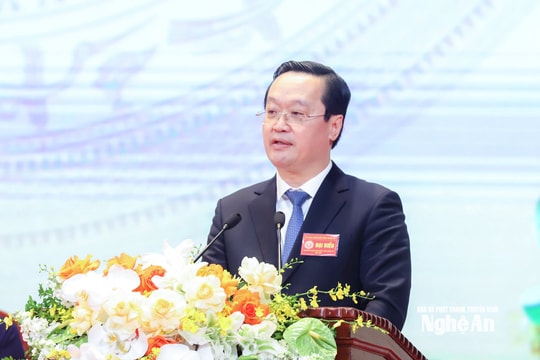
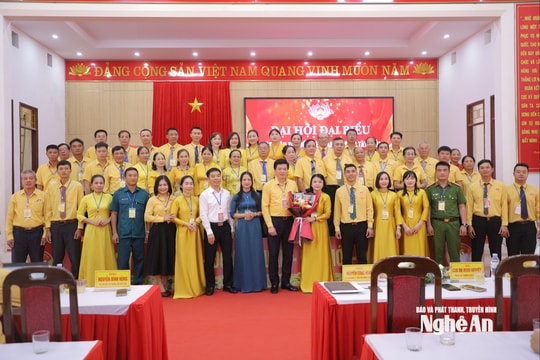
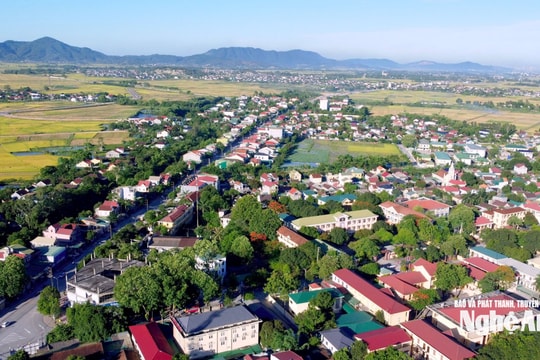
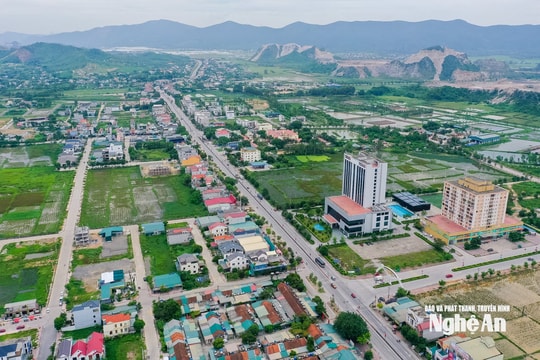
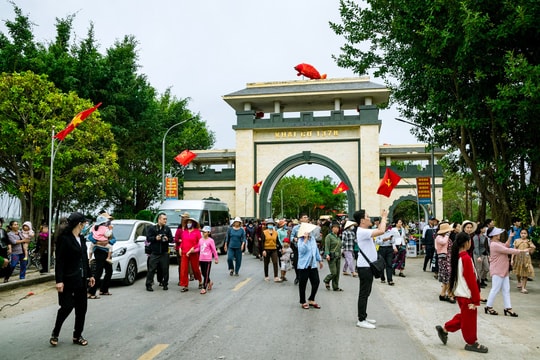
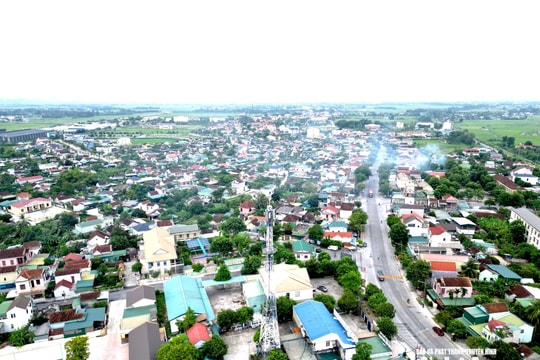
.jpg)
